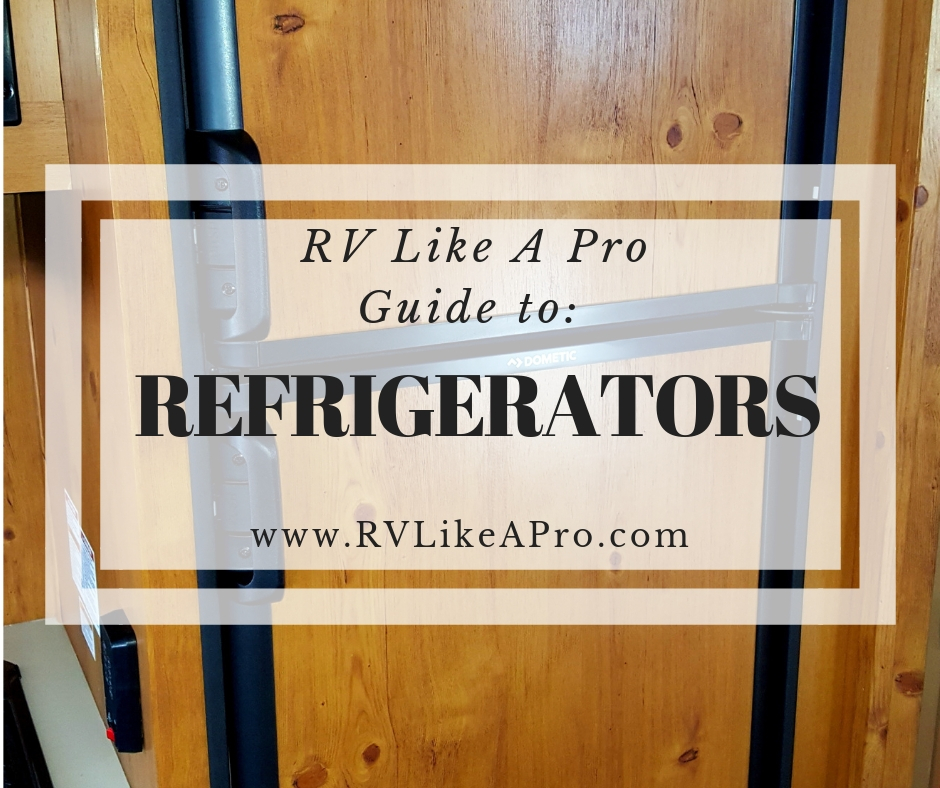
How to Work an RV Refrigerator
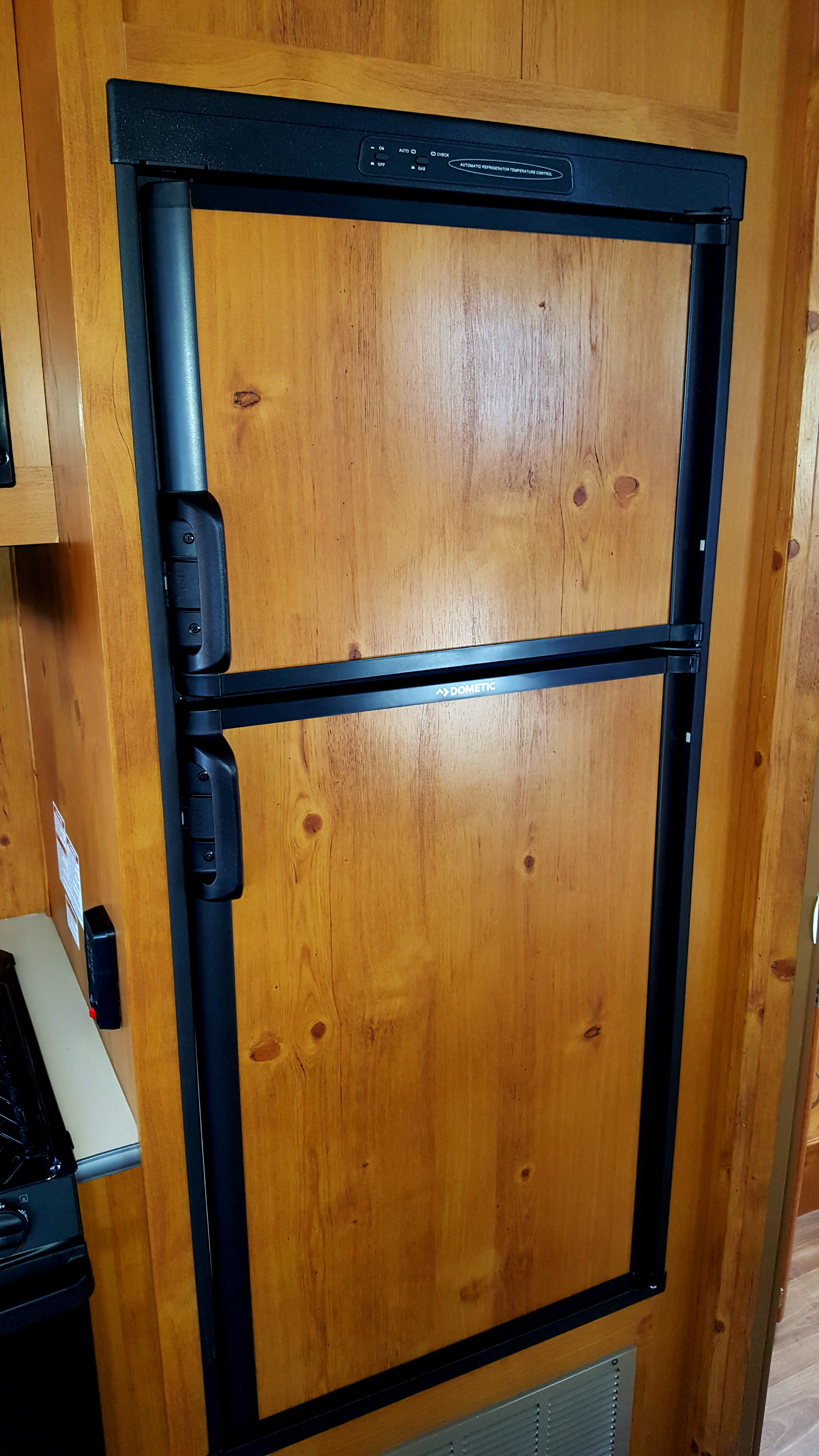
One important difference with an RV refrigerator is that it will take the refrigerator about 24 hours to cool down to the desired temperature. I recommend you plug it in, and turn it on, at least one day before you plan on using it. Also note: as we stated earlier the RV refrigerator uses gravity to cool. Because of this, the more level your camper is, the better your refrigerator will work. For example, if your driveway is steep, and you can’t get the camper level, don’t run it there. Maybe the street or side yard is a better option.
To adjust the temperature of the refrigerator, there are a couple of variations. Some RV refrigerators have button on the outside of the refrigerator near the top front of the refrigerator, near the on/off switch. Others have a little sensor located on the fins inside the refrigerator.
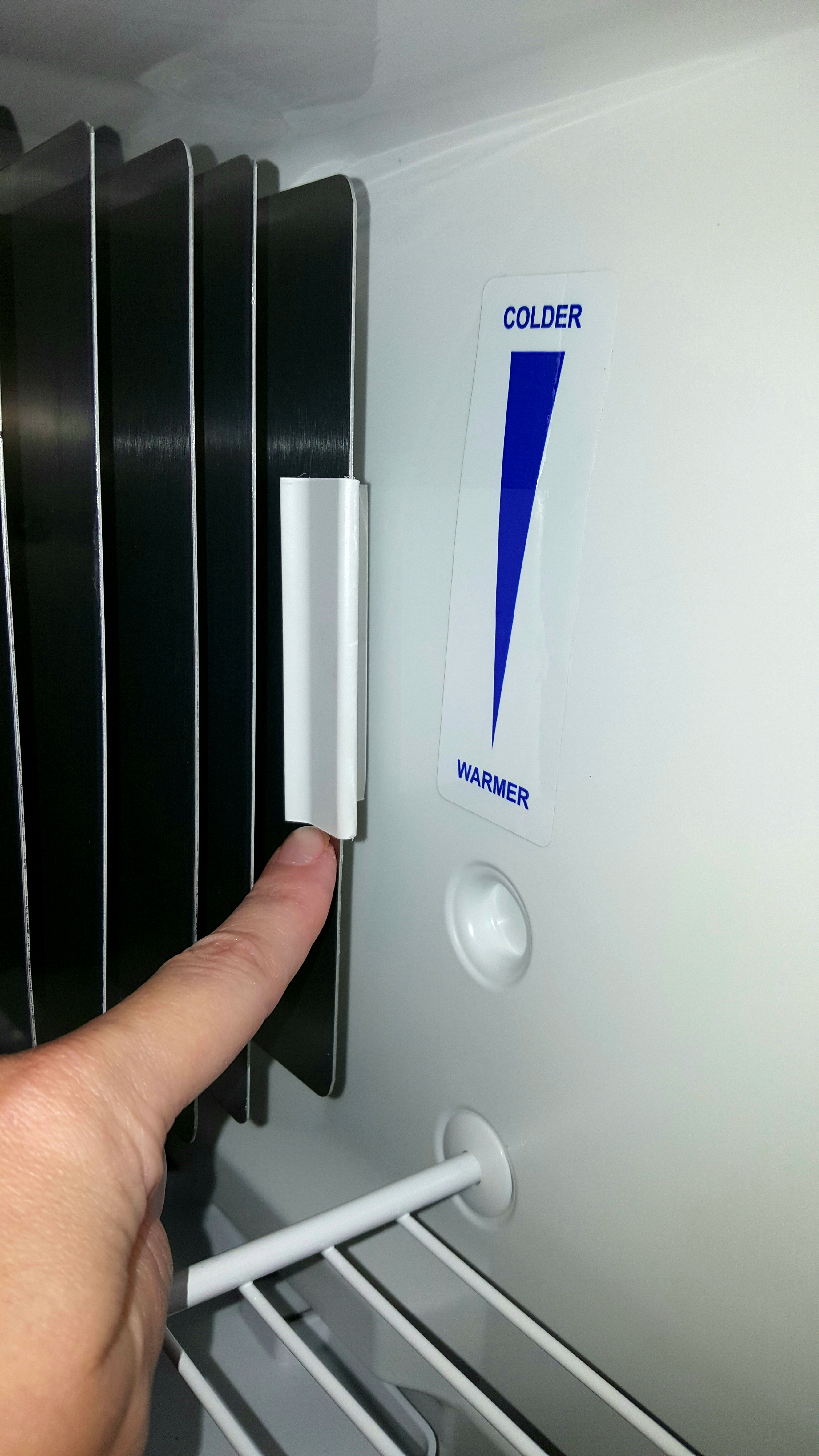
The higher the sensor is on the aluminum fins the colder the refrigerator gets. RV refrigerators are designed so that the freezer section cools down first (there is often, but not always, no temperature adjustment for the freezer) and the refrigerator section cools down second. Again it can take 24 hours for your refrigerator and freezer to reach the desired temperature. One way to help your refrigerator to cool more quickly is to put cold items in your refrigerator. It is difficult for your RV refrigerator to recover after you put something warm in it (think a warm case of pop). Also, a good rule of thumb is: for every minute that you leave the door on your refrigerator open it takes about an hour for it to recover.
The back side of the refrigerator stays cool by drawing air through the refrigerator cover on the outside of the camper and vents heat out through the roof vent.
Some larger refrigerators, or refrigerators located in slide rooms, have a small computer type fan behind the refrigerator to help move air. If the back of the refrigerator becomes hot, the fan will automatically turn on (just like with a desktop computer). This helps cool down the back side of your refrigerator. It is normal to hear this fan turn on. It does not mean there is anything wrong. The fan is just helping your refrigerator cool better.
Power Sources
An RV refrigerator can operate an electric 110 power, propane (LP gas), or (on some models) 12 volt power.
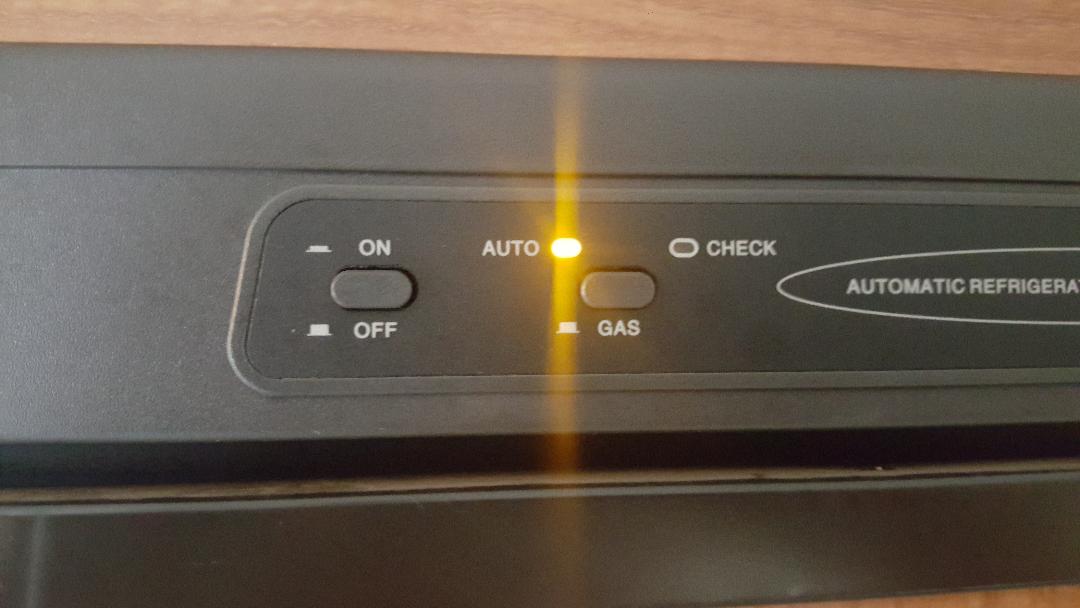
It is important to note that the sparker that ignites the propane only sparks for about 30 seconds. If the refrigerator fails to light after 30 seconds, the refrigerator will give up and the “check” light will come on. RV refrigerators will run on propane only if your propane tanks are open and you have gas in them.
A word of advice: before you leave for your trip, make sure your refrigerator did in fact switch to propane. The last thing you need is to get to your destination only to realize that your refrigerator is off because it didn’t ignite.
If your refrigerator has the 12 volt (battery) electric option it will first try to go to 110 power in auto mode. Then when power is cut, it will try to go to propane or gas. If there’s no propane or gas available it will run on 12-volt or battery power.
A word of caution about running your refrigerator on 12 volt power. If you are dry camping (boondocking) or you are traveling and stop for a long period of time, your refrigerator could be drawing down your battery. If your tow vehicle’s power cord is connected to your RV, you could also be draining your tow vehicle’s battery.
The “check” light
The “check” light will come on on the top front of the refrigerator if the refrigerator fails to light while switching to propane. This light is an indicator that your refrigerator failed to light and needs to be checked. Pay attention to this light. If this light is on, your refrigerator is not working.
To reset the check button, shut the refrigerator off and wait a couple seconds. Then, turn it back on. The refrigerator will reset and first try to run on electric. If no power is available, it will begin sparking and try to run on propane again.
Maintenance
Once a year I remove the refrigerator cover on the outside of my camper and blow it out with an air hose. Is usually find a lot of dust and cobwebs. Lady bugs also like to go in there. I recommend blowing it out to keep it nice.
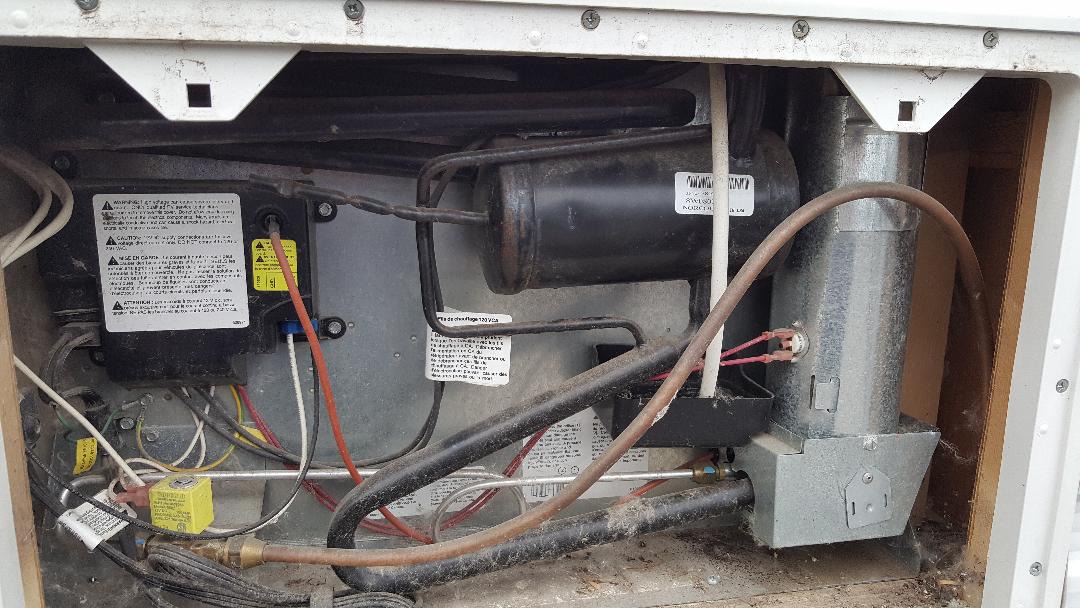
Example of why you need to clean the back of your refrigerator.
Common Questions:
Every Tech gets the question: “Can I travel down the road with my refrigerator operating on propane?” On the old refrigerators, sometimes the pilot would blow out and the refrigerator would not work properly. In modern refrigerators, there should be no issue with running your refrigerator while traveling down the highway operating in gas mode.
Another question we get is: “What about when we are traveling and the RV is not level (like going through mountains) will the refrigerator work correctly then?” Yes. The motion and vibration of traveling will keep the gasses moving and the refrigerator will work fine.
I have also heard people concerned about having a small pilot flame for running their refrigerator while they go to a gas station. The worry is that they might have an explosion. I have never heard of a gas station blowing up due to an RV sitting too close to the pump with its refrigerator pilot light on. If you are concerned, park with your camper away from the gas pumps.
Happy Camping!


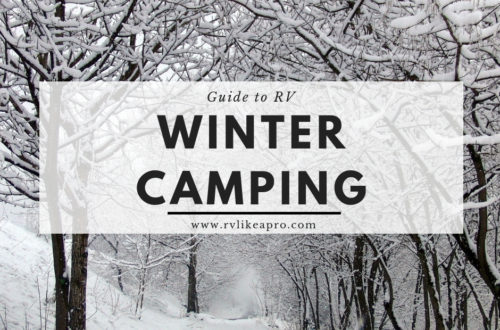
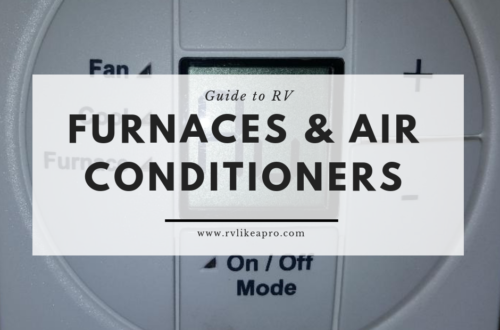
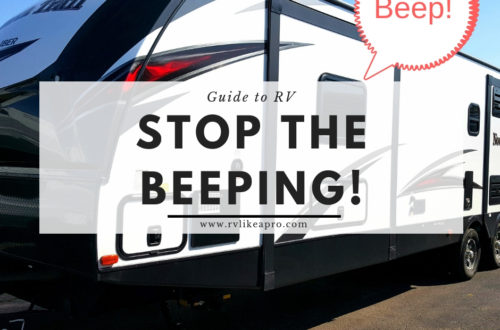
20 Comments
julie
I had no idea how much I didn’t know a/b RV’ing. This is a great site!
Katie
Great tips! I so wish we had one of the bigger residential refrigerators in ours haha.
Molly
Great tips! I had no idea about gravity cooling.
Stacey Damiano
Wow, such great detailed information. It’s great to know that there are so many options, but so much to consider!
Alexandra
I actually never knew this. I have friends that live year round in an rv. That’s pretty rough though if you need one full hour to get the temperature back to what it should be for every minute the door is open.
Jamie T
I unfortunately don’t have an RV, but very informative.
Tiffany
So many things to think about! Thanks for the info!
Leigh Ann
I never knew there was so much information on refrigerators!
jen
I wish I knew all this when we were in an RV. Could have prevented the time we all got food poison LOL
Nikki
I never knew the frig worked differently. Thanks for the info. The hubby is home from his last job and at some point in the next few weeks I’m dragging him to take a look at RV’s and hopefully it will be one step closer to convincing him this is the way to go!
Tracey Skafidas
This is great info for Rvers!
Pauline
Great info. We are on our second camper and these are great tips.
Junell DuBois
Great information! I never knew there were so many different things about RVs.
Liza
One of the most important parts! At least for me hahaha
Anna
I did not know that the refrigerator will work just fine, even when traveling. Thank you for sharing this information.
Caitlin
Oh wow I would not have thought about keeping the back clean! That picture makes me want to go clean mine and I don’t even live in an RV!! Haha
Tricia Snow
I never thought about the back maintenance! Great tip!
Cindy
I had no idea RV refrigerators operated this way. I learn so much reading your posts.
T.M. Brown
Honestly, you surprise me each and every week with all you know about living the RV-life. You are an amazing resource for those who have one or are looking to buy one!
Angela Greven | Mean Green Chef
I had no clue about gravity cooling and we had a diesel pusher back in the day. You’re all so helpful and knowledgable, thanks so much for sharing! Maybe one day we’ll get back on the road! 🙂